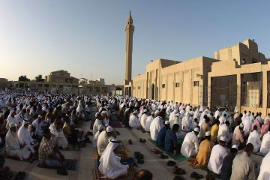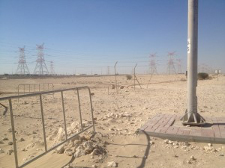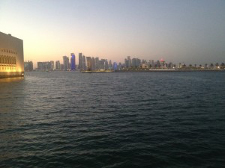Posts Tagged ‘Emir’
In Qatar, calls for release of prisoners come with the start of Ramadan
(This piece appears on GlobalPost.)
Commentary: The release of one imprisoned poet during Ramadan may seem a small act, but would be a significant humanitarian act toward a more enlightened state.

Muslim men perform the Eid Al-Fitr morning prayers outside the Ali Bin Ali mosque in Doha on September 30, 2008. Eid al-Fitr festivities marking the end of the Muslim holy fasting month of Ramadan are celebrated starting today in most of the Middle East countries. (KARIM JAAFAR/AFP/Getty Images)
I am not a Muslim, but I am focused on the arrival of Ramadan this year. The month-long observance began this weekend for 1.6 billion Muslims around the world. A time of fasting, increased prayer and charity, Ramadan is also a time when governments of Islamic countries grant amnesties to citizens and to those in prison.
Ramadan, the ninth month in the Islamic calendar, observes the time when Muhammad, a caravan trader wandering the desert near Mecca contemplating his faith, is said to have been called to receive the word of Allah. The revelation was eventually transcribed as the verses of the Qur’an.
The reconciliation of this holy time with political dispensations varies according to countries and their leaders. My focus is on the country of Qatar and the particular case of a poet in prison. Qatar has been in the news lately as the recipient of the five Guantanamo detainees. This transaction has taken the headlines.
But also in prison in Qatar is poet Mohammed Al Ajami, who has spent more than two years in solitary confinement for two poems. A father of four, Al Ajami is serving a 15-year sentence (reduced from life imprisonment) for poems criticizing the Emir and supporting the Arab Spring. One of the poems was read in a private reading in his apartment in Cairo, but was secretly taped by a fellow poet and uploaded on YouTube. Al Ajami was eventually charged a year and a half later with “encouraging an attempt to overthrow the existing regime.”
Al Ajami grew up as a friend in the household of the Emir’s grandfather, but he has refused to apologize for his poetry, and thus he continues to live behind bars. There is no legal recourse left to him. The only recourse is an amnesty or pardon by the current Emir. Should Al Ajami be released there are appointments he might have as a poet abroad.
The tradition of amnesties during Ramadan include last year’s release of 14 Nepalese in Qatar, three Britons jailed in Dubai, 65 prisoners in Gaza, , 82 Egyptians released in 2012 from Saudi Arabian jails. In a time when Qatar is facing criticism for its migrant domestic workers’ conditions, a time when Qatar is bidding for international conferences and facing controversy over its 2022 hosting of the World Cup, the release of one poet during Ramadan seems a small, but significant and humanitarian, act, an act which would evidence a more enlightened state to many who are looking for enlightenment in that region of the world.
Mohammed al-Ajami is an honorary member of PEN American Center. Joanne Leedom-Ackerman, a former reporter for the Christian Science Monitor, is a Vice President of PEN International and PEN American Center.
Qatar: A Poet in a Desert Cell
(This piece also appears on GlobalPost.)
DOHA, QATAR — We stood outside the guard house in the desert wind on the outskirts of the city. Doha Central Prison rose on the horizon of a barren, rock-strewn landscape, electric wires cutting across a cloudless sky. We had been told we had permission to visit Qatari poet Mohammed al-Ajami, whose 15-year sentence for two poems had been confirmed the previous day by the high court.


For five hours we stood, paced, sat in broken chairs, negotiating on mobile phones with the Attorney General’s office. The prison authorities had not received the request for our visit. The guards changed twice while we waited, guards from different nationalities as are most of the workers in Qatar. They were friendly, shared fresh oranges with us as the hours passed, but had no authority to help.
Inside the prison members of al-Ajami’s family were visiting him and knew we were out there. Al-Ajami knew we were there and wanted to see us. No one had gotten this far, the family later told us. But in the end we were denied.
For the last two years Mohammed al-Ajami has been in solitary confinement with limited access to visitors. A known poet in the Gulf and the father of four, al-Ajami was a literature student at Cairo University in 2010 when he recited a poem in his apartment among friends, a poem that allegedly criticized the Emir. The poem was in response to a poem by a fellow poet, but one of the students in the apartment recorded al-Ajami and uploaded the reading on YouTube. According to al-Ajami’s lawyer Dr. Najeeb al-Nauimi, a former Justice Minister in Qatar, the poem was spoken in a private setting and violated no law. Another of al-Ajami’s poems “Jasmine” was circulated on the internet and expressed support for the uprising in Tunisia and criticized all the Arab regimes.
Sixteen months later, al-Ajami was summoned in Doha and arrested, eventually charged with “encouraging an attempt to overthrow the existing regime,” “claiming that the Emir misused and not abided by the Qatar Constitution” and “criticizing the Crown Prince,” who has subsequently become the Emir. Al-Ajami was sentenced to life imprisonment after a trial held in secret where the Investigating Judge, a non-Qatari, was also the Chief Judge. [The Emir appoints all judges on recommendation from the Supreme Judicial Council, 75% of whom are foreign nationals, dependent on residency permits.] Later on appeal, Al-Ajami’s sentence was reduced to 15 years.
As representatives of PEN International and PEN American Center we—two American women—had come to Doha to argue for the release of Mohammed Al-Ajami, but by the time our planes landed, the court had already upheld the 15-year sentence. All judicial appeals were now exhausted.
A country of two million people, but with only 250,000 citizens, Qatar is one of the, if not the, richest nation per capita. During his reign the former Emir set a course of modernization and brought reform to the government, brought institutions of higher education to the kingdom and developed programs in the arts and set up a Center on Media Freedom. The West looks to Qatar as a leader in the region. The imprisonment of a poet on an offense of lese majeste has confounded many though in an interview, the Prime Solicitor General insisted the charges were not about freedom of speech but were brought because the poet publicly offended people and urged the overthrow of the government.
In Qatar itself the case has received little coverage. The news media is owned by the government and the Emir. Those familiar with the ways of the kingdom say the only recourse now for al-Ajami is a pardon by the Emir. However, if an apology is necessary for that pardon, a standoff may occur. According to al-Ajami’s lawyer, the poet has questioned why he should apologize for having spent the last two years in solitary confinement for sharing a poem in a private setting. His lawyer notes that Al-Ajami has had his career disrupted; he has missed seeing his family for two years, including missing the birth of his youngest child.
As I flew out of Qatar, I stared at the desert below now filled with sky scrapers and modern museums rising from the land. I considered the math. Over 90% of the jobs are occupied by men and women of other countries who have no rights of citizenship and can be deported. Only one in ten people are citizens; half of these are women, who have limited rights; over a quarter are children and the elderly. The country is run by a very small minority. I questioned whether the math was on the side of history.

Extensive gas reserves developed in the 1990’s have given Qatar its huge income and given the country a seat at the leadership tables of the region and the globe. But if the country puts its poets in prison, one must wonder. On the other hand, if the new Emir, just 33 years old, educated in Britain, pardons poet al-Ajami unconditionally as PEN urges, then perhaps the curve of history will extend outwards, at least for a while.
[Mohammed al-Aljami is an honorary member of PEN American Center. PEN’s representatives in Doha were Joanne Leedom-Ackerman, Vice President of PEN International and Trustee of PEN American Center, and Sarah Hoffman, Freedom to Write Coordinator for PEN American Center.]
To sign a letter urging a pardon for Mohammed al-Ajami, click here.